I have a problem with the following code. My task is, I have to have radio buttons in the first column and when a user selects that radio button that row is selected and sent for processing. But my problem is, I am able to select the radio button which are in the first column, but afterwards when user clicks in any part of the table then my clicked radio button is being unchecked. I am not able to figure, why it is happeneing. I am really stuck with this problem. Help required. The following code shows my problem.
import java.awt.Component;
import java.awt.event.ItemEvent;
import java.awt.event.ItemListener;
import java.util.ArrayList;
import java.util.List;
import javax.swing.ButtonGroup;
import javax.swing.DefaultCellEditor;
import javax.swing.JCheckBox;
import javax.swing.JDialog;
import javax.swing.JPanel;
import javax.swing.JRadioButton;
import javax.swing.JScrollPane;
import javax.swing.JTable;
import javax.swing.SwingUtilities;
import javax.swing.table.AbstractTableModel;
import javax.swing.table.TableCellRenderer;
public class DisplayTable extends JDialog {
public void initialize() {
SourceTableModel stm = new SourceTableModel();
JTable sourceTable = new JTable(stm);
sourceTable.getColumnModel().getColumn(0).setCellRenderer(new RadioButtonRenderer());
sourceTable.getColumnModel().getColumn(0).setCellEditor(new RadioButtonEditor(new JCheckBox ()));
JPanel panel = new JPanel();
panel.add(new JScrollPane(sourceTable));
add(panel);
setModal(true);
pack();
setVisible(true);
}
public static void main(String[] args) {
SwingUtilities.invokeLater(new Runnable() {
public void run() {
new DisplayTable().initialize();
}
});
}
}
class SourceTableModel extends AbstractTableModel{
private static final long serialVersionUID = 1L;
private List<SourceModel> sourceList = new ArrayList<SourceModel>();
private String[] columnNamesList = {"Select", "Group", "Work"};
public SourceTableModel() {
this.sourceList = getSourceDOList();
}
public String getColumnName(int column) {
return columnNamesList[column];
}
public int getRowCount() {
return sourceList.size();
}
public int getColumnCount() {
return columnNamesList.length;
}
public Class<?> getColumnClass(int columnIndex) {
return (columnIndex == 0 ? Boolean.class : String.class);
}
public boolean isCellEditable(int rowIndex, int columnIndex) {
return (columnIndex == 0 ? true : false);
}
public void setValueAt(Object aValue, int rowIndex, int columnIndex) {
SourceModel model = (SourceModel) sourceList.get(rowIndex);
switch (columnIndex) {
case 0:
model.setSelect((Boolean)aValue);
break;
case 1:
model.setFactory((String) aValue);
break;
case 2:
model.setSupplier((String) aValue);
break;
}
fireTableCellUpdated(rowIndex, columnIndex);
}
public Object getValueAt(int rowIndex, int columnIndex) {
SourceModel source = sourceList.get(rowIndex);
switch(columnIndex){
case 0:
return source.isSelect();
case 1:
return source.getFactory();
case 2:
return source.getSupplier();
default:
return null;
}
}
private List<SourceModel> getSourceDOList() {
List<SourceModel> tempSourceList=new ArrayList<SourceModel>();
for (int index = 0; index < 5; index++) {
SourceModel source = new SourceModel();
source.setSelect(false);
source.setFactory("group");
source.setSupplier("Work");
tempSourceList.add(source);
}
return tempSourceList;
}
}
class SourceModel {
private boolean select;
private String factory;
private String supplier;
public SourceModel() {
// No Code;
}
public SourceModel(boolean select, String factory, String supplier) {
super();
this.select = select;
this.factory = factory;
this.supplier = supplier;
}
public boolean isSelect() {
return select;
}
public void setSelect(boolean select) {
this.select = select;
}
public String getFactory() {
return factory;
}
public void setFactory(String factory) {
this.factory = factory;
}
public String getSupplier() {
return supplier;
}
public void setSupplier(String supplier) {
this.supplier = supplier;
}
}
class RadioButtonEditor extends DefaultCellEditor implements ItemListener {
public JRadioButton btn = new JRadioButton();
public RadioButtonEditor(JCheckBox checkBox) {
super(checkBox);
}
public Component getTableCellEditorComponent(JTable table, Object
value, boolean isSelected, int row, int column) {
if (value==null)
return null;
btn.addItemListener(this);
if (( (Boolean) value).booleanValue())
btn.setSelected(true);
else
btn.setSelected(false);
return btn;
}
public Object getCellEditorValue() {
if(btn.isSelected() == true)
return new Boolean(true);
else
return new Boolean(false);
}
public void itemStateChanged(ItemEvent e) {
super.fireEditingStopped();
}
}
class RadioButtonRenderer implements TableCellRenderer {
public JRadioButton btn = new JRadioButton();
public Component getTableCellRendererComponent(JTable table, Object value,
boolean isSelected, boolean hasFocus, int row, int column) {
if (value==null) return null;
if(((Boolean)value).booleanValue())
btn.setSelected(true);
else
btn.setSelected(false);
if (isSelected) {
btn.setForeground(table.getSelectionForeground());
btn.setBackground(table.getSelectionBackground());
} else {
btn.setForeground(table.getForeground());
btn.setBackground(table.getBackground());
}
return btn;
}
}
EDIT:
I have updated my code and I have used Boolean class for the first column. The problem which I am facing is, if I remove super.fireEditingStopped(); from RadioButtonEditor class then I am able to check and then if I click at any part of the table then checked one I being unchecked. If I keep the super.fireEditingStopped(); then I am not even able to check the Radio button.
I know that super.fireEditingStopped(); will stop editing. But my question is how to check it?
P.S: Sorry I have posted my entire code. I thought it will be easy for some one to look at the problem.
This is the screen shot of the program.
